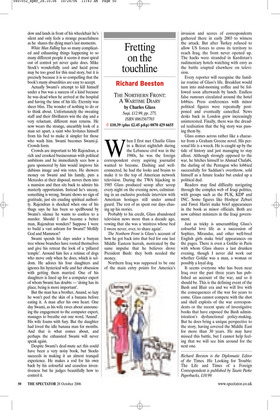Fretting on the touchline
Richard Beeston
THE NORTHERN FRONT: A WARTIME DIARY by Charles Glass Saqi, £12.99, pp. 275, ISBN 0863567703 ✆ £10.39 (plus £2.45 p&p) 0870 429 6655 When I first met Charlie Glass in a Beirut nightclub during the Lebanese civil war in the 1980s, he was the foreign correspondent every aspiring journalist wanted to become. Dashing and wellconnected, he had the looks and brains to make it to the top of American network television. During the TWA hijacking in 1985 Glass produced scoop after scoop every night on the evening news, culminating in an exclusive poolside interview with American hostages still under armed guard. The rest of us spent our days chasing up his stories.
Probably to his credit, Glass abandoned television news more than a decade ago, vowing that she was a ‘mistress whose bed I swore never, ever, to share again’.
The Northern Front is Glass’s account of how he got back into that bed for one last Middle Eastern hurrah, motivated by the same impulse that he believes drove President Bush: they both needed the money.
Northern Iraq was supposed to be one of the main entry points for America’s invasion and scores of correspondents gathered there in early 2003 to witness the attack. But after Turkey refused to allow US forces to cross its territory to reach Iraq, the front never opened up. The hacks were stranded in Kurdistan’s rudimentary hotels watching with envy as the battle erupted elsewhere on television.
Every reporter will recognise the familiar routine of Glass’s life. Breakfast would turn into mid-morning coffee and be followed soon afterwards by lunch. Endless false rumours circulated around the hotel lobbies. Press conferences with minor political figures were repeatedly postponed and eventually cancelled. News desks back in London grew increasingly uninterested. Finally, there was the dreaded realisation that the big story was passing them by.
Glass comes across rather like a character from a Graham Greene novel. His personal life is a wreck. He is caught up by the tide of history and just managing to stay afloat. Although strongly opposed to the war, he hitches himself to Ahmad Chalabi, the darling of the Pentagon who lobbied successfully for Saddam’s overthrow, sold himself as a future leader but ended up a political dud.
Readers may find difficulty navigating through the complex web of Iraqi politics, with groups such as the PUK, KDP and INC. Some figures like Hoshyar Zebari and Fawzi Hariri make brief appearances in the book as minor officials. Both are now cabinet ministers in the Iraqi government.
Just as tricky is unscrambling Glass’s colourful love life as a succession of Sophies, Mirandas, and other well-bred English girls make brief appearances on the pages. There is even a Goldie in Paris with whom Glass shares a last drunken evening, though I never did work out whether Goldie was a man, a woman or possibly a loyal dog.
It seems everyone who has been near Iraq over the past three years has published an account of the war, and so it should be. This is the defining event of the Bush and Blair era and we will live with the consequences of the war for years to come. Glass cannot compete with the shot and shell exploits of the war correspondents or the recent spate of investigative books that have exposed the Bush administration’s dysfunctional policy-making. But he does bring a unique perspective to the story, having covered the Middle East for more than 30 years. He may have missed this battle, but I cannot help feeling that we will see him around for the next one.
Richard Beeston is the Diplomatic Editor of the Times. His Looking for Trouble: The Life and Times of a Foreign Correspondent is published by Tauris Parke Paperbacks, £10.99.


























































































 Previous page
Previous page